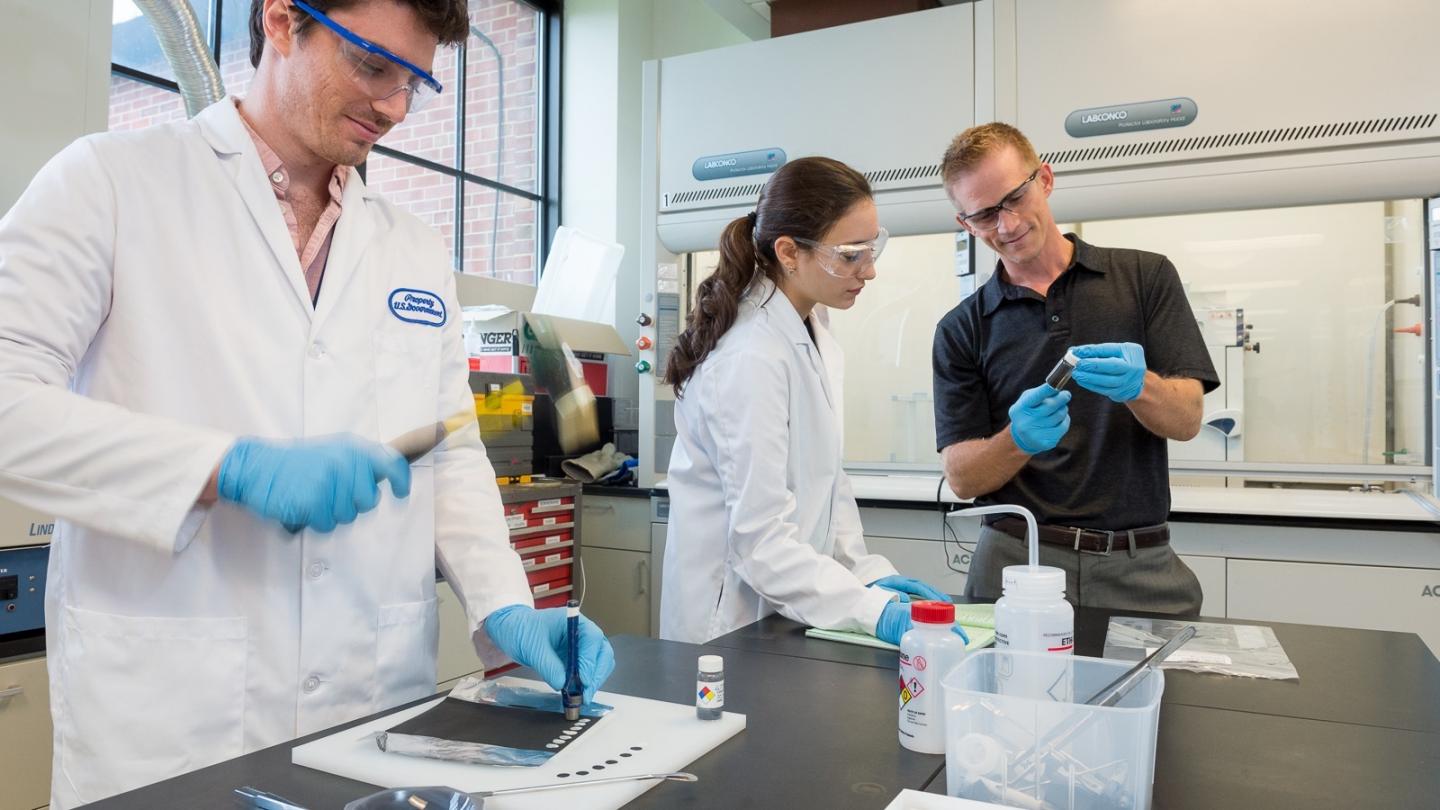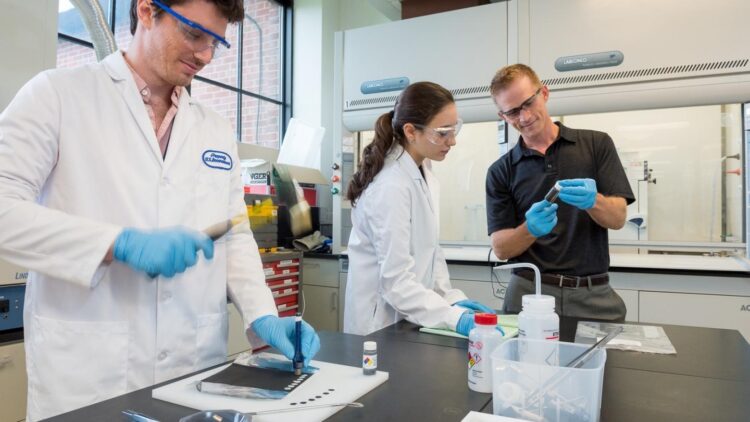
Credit: (Image by Mark Lopez / Argonne National Laboratory.)
The projects will help bring technologies for safer, more robust batteries from the laboratory to commercial markets.
Six innovative battery manufacturing projects led by the U.S. Department of Energy’s (DOE) Argonne National Laboratory were recently awarded funding through DOE‘s Office of Energy Efficiency and Renewable Energy (EERE). The projects, which span a range of essential components for energy storage, are among 13 battery manufacturing research efforts at national laboratories that earned combined funding of almost $15 million over three years.
The projects were selected in August as part of a Battery Manufacturing Lab Call from DOE, which sought public-private partnerships to help solve engineering hurdles for advanced battery materials and devices. The projects will also address the Energy Storage Grand Challenge, a DOE-wide effort to create and sustain global leadership in energy storage use and exports.
“With these newly funded projects, Argonne continues its long history of developing cutting-edge battery technologies and helping bring them to market.” — Venkat Srinivasan, ACCESS director and deputy director, JCESR.
Better batteries are an important U.S. research objective that will bolster the nation’s transportation fleet, strengthen its electric grid and enhance energy efficiency. The funded efforts will help make batteries cheaper, more powerful and longer lasting, among other improvements.
Together with national laboratory researchers, industry partners on each project will help accelerate new technologies for manufacturing energy storage solutions. Such advancements will help build a domestic supply chain for advanced batteries, avoiding dependence on foreign sources of needed materials such as lithium.
“With these newly funded projects, Argonne continues its long history of developing cutting-edge battery technologies and helping bring them to market,” said Venkat Srinivasan, director of the Argonne Collaborative Center for Energy Storage Science (ACCESS) and deputy director of the Joint Center for Energy Storage Research (JCESR).
For more than 30 years, Argonne researchers have developed materials for cheaper, stronger and safer batteries, which have become critical components of everything from phones to cars. Much of the research for the new projects will be conducted at Argonne’s Manufacturing Engineering Research Facility (MERF), which is dedicated to bridging the gap between small-scale laboratory research and high-volume manufacturing.
“These projects will bring advanced battery technologies closer to the point where consumers can benefit from them,” said Greg Krumdick, director of Argonne’s Applied Materials division.
In addition to leading six projects funded as part of DOE‘s Battery Manufacturing Lab Call, Argonne is a research partner on a seventh project led by Brookhaven National Laboratory. The projects, led by researchers from the Applied Materials and Chemical Science and Engineering divisions, as well as MERF, are:
Advanced brine processing to enable U.S. lithium independence
This research will create a more cost-effective process to produce lithium hydroxide, a battery raw material needed for all lithium-based batteries. The innovative processing technology could potentially be used for lithium extraction and recycling as well.
Industry partner: Albemarle/Ameridia (North Carolina).
Lead researcher: Jeff Spangenberger.
Hydrothermal production of single crystal Ni-rich cathodes with extreme rate capability
The hydrothermal process is a rapid potentially high-volume, tunable manufacturing method that will be used to produce single-crystalline, nickel-rich cathode materials for lithium-ion batteries with superior cyclability and fast-charge capability.
Industry partner: Hunt Energy Enterprises (Texas).
Lead researcher: YoungHo Shin.
Continuous flow reactor synthesis of advanced electrolyte components for lithium-ion batteries
Argonne has developed a safer, more economical procedure for synthesizing trifluoropropylene carbonate (TFPC), a promising new electrolyte material. This enabling component cannot be purchased in the U.S. in sufficient amounts and quality for researchers and battery developers to test and validate. The project focus is on scaling up this process to commercially relevant sizes.
Industry partner: Koura Global (Massachusetts).
Lead researcher: Kris Pupek.
Continuous high yield production of defect-free, ultrathin sulfide glass electrolytes for next generation solid-state lithium metal batteries
The goal of this project is to identify the source of defects in sulfide glasses and determine their impact on the stability of the solid electrolyte. Understanding these defects, and identifying ways to mitigate them, is a critical step toward manufacturing ultrathin glass sheets for solid-state batteries.
Industry partner: PolyPlus (California).
Lead researcher: Tim Fister.
Scale-up production of graphene monoxide for next-generation lithium-ion battery anodes.
Graphene monoxide (GmO), a performance-enhancing component for lithium-ion battery anodes with the potential to improve safety, low-temperature operation and fast charging has been developed by researchers at the University of Wisconsin, Milwaukee. Realizing the benefits of GmO requires large amounts of the material. This project will bring the synthesis out of the academic lab and into a pre-commercial scaled-up process.
Industry partner: SafeLi LLC (Wisconsin).
Lead researcher: Trevor Dzwiniel.
Scaling halide-type solid electrolytes for solid-state batteries
This project aims to develop, integrate and validate innovative processing technologies for a new class of lithium-ion conductors with the promise of power and energy density over batteries with liquid components. Project outcomes include establishing electrolyte composition and densification specifications and identification of promising solid-state processing technology routes.
Industry partner: Saint-Gobain Ceramics & Plastics (Pennsylvania).
Lead researcher: Zonghai Chen.
Commercially viable process for surface conditioning of high-nickel low-cobalt cathodes (led by Brookhaven National Laboratory)
This project will take innovations in battery materials processing and characterization developed and implemented by Argonne and Brookhaven and apply them to battery electrode manufacturing processes under development by their New York state partners. The goals of the project are to show pre-commercial production of a novel cathode material, enabling low-cobalt batteries with improved reproducibility and reduced manufacturing costs.
Industry partner: C4V & Primet (New York).
Lead researcher: Zonghai Chen.
The program is jointly funded by EERE‘s Advanced Manufacturing Office and Vehicle Technologies Office with one-to-one matching funds from the private sector and investor community.
###
Learn more about batteries at DOE Explains which offers straightforward explanations of key words and concepts in fundamental science.
The Office of Energy Efficiency and Renewable Energy supports early-stage research and development of energy efficiency and renewable energy technologies to strengthen U.S. economic growth, energy security, and environmental quality.
Argonne National Laboratory seeks solutions to pressing national problems in science and technology. The nation’s first national laboratory, Argonne conducts leading-edge basic and applied scientific research in virtually every scientific discipline. Argonne researchers work closely with researchers from hundreds of companies, universities, and federal, state and municipal agencies to help them solve their specific problems, advance America’s scientific leadership and prepare the nation for a better future. With employees from more than 60 nations, Argonne is managed by UChicago Argonne, LLC for the U.S. Department of Energy’s Office of Science.
The U.S. Department of Energy’s Office of Science is the single largest supporter of basic research in the physical sciences in the United States and is working to address some of the most pressing challenges of our time. For more information, visit https:/
Media Contact
Lynn Tefft Hoff
[email protected]
Original Source
https:/





